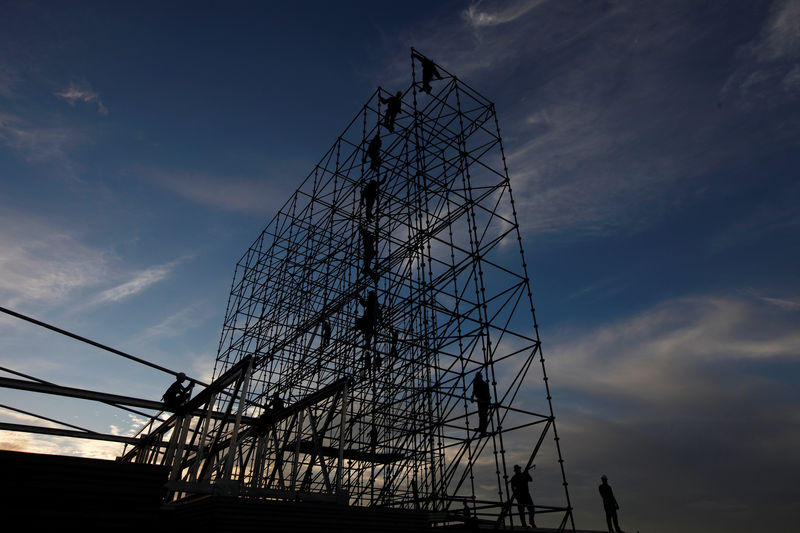 © Reuters. Employees work on the construction of a metal structure at Iracema beach in Fortaleza
© Reuters. Employees work on the construction of a metal structure at Iracema beach in FortalezaBy Gabriel Burin
BUENOS AIRES (Reuters) – Brazil’s sluggish economic growth will pick up smartly this year, provided President Jair Bolsonaro’s new government implements promised budget-tightening reforms and helps expand the private sector, a Reuters poll showed on Friday.
Brazilian growth was forecast at 2.4 percent in 2019 versus 1.3 percent last year, according to the median estimate of 53 economists surveyed Jan. 9-16. It would be the fastest since 2013, when a commodity-led prosperity cycle ended abruptly.
Still, that was a slight downgrade from a poll taken in October last year, as was the 2020 forecast of 2.5 percent, implying analysts are if anything a bit more cautious about Bolsonaro’s ability to shift the economy into a higher gear.
Expectations are pinned on the overhaul of a costly state pension system the newly elected president blames for chronic budget deficits. Resistance from public servants, unions and other groups has derailed similar efforts in the past.
“The passage of a modest-to-ambitious pension reform would encourage greater investment, attract capital inflows, (and) drive a stronger exchange rate,” Standard & Poor’s Latin America Senior Economist Elijah Oliveros-Rosen said.
Replacing the current arrangement based on a guaranteed package of retirement benefits with private pension funds fed by individual contributions would lift internal savings and propel the economy, a government official said last week.
“The uncertainty lies on how ambitious the final bill will be, and whether it will be enough to arrest the current rapid growth in public debt within a reasonable timeline,” Oliveros-Rosen added.
In a sign of difficulties to get the plan moving even at the first stage, divisions quickly emerged between Bolsonaro’s political and economic teams over changes to Brazil’s social security and its complex tax code.
However, improving business sentiment coupled with stability in local markets and relatively low interest rates would prompt a 9.3 percent jump in fixed investment, fueling the recovery, Credit Suisse (SIX:) said in a report.
Brazilian shares () have yielded investors almost 15 percent in dollar terms since the end of 2018 after Bolsonaro’s first policy clues. The mood in the streets is less cheerful, with high unemployment expected to persist.
LESS OPTIMISM IN MEXICO, ARGENTINA
The outlook for Mexico’s economy is more opaque.
Poll participants projected growth at 2.0 percent in 2019, close to last year’s performance, while all but one of eight analysts who answered a separate question saw risks tilted to the downside.
Credit Suisse was the most pessimistic with a forecast of just 1.2 percent, citing weaker U.S. growth, reduced confidence among private sector firms, and likely struggles to execute the country’s budget in the first year of a new government.
“Gasoline shortages in various cities in early 2019 will not help either,” the bank added. A crackdown by President Andrés Manuel López Obrador on rampant fuel theft has turned into a battle to prevent economic chaos.
Credit Suisse cited the cancellation of the construction of Mexico City’s new airport and the decision to halt oil auctions as elements hurting sentiment, and warned of uncertainty regarding legislative proposals from López Obrador and his party.
Some items to watch in the next few quarters include potential changes to legislation on commissions charged by commercial banks and changes to taxation to specific industries, it said.
Mexico’s central bank was seen keeping its guard up in the face of potential market-disruptive forces. Economists in the poll anticipated the Bank of Mexico’s benchmark rate to stay at 8.25 percent during 2019, its highest in more than 10 years.
Meanwhile, Argentina’s economy was expected to contract 1.2 percent this year after shrinking 2.5 percent in 2018. Analysts maintain faith in grains exports as the engine that will start to bring about expansion again in the second half of the year.
But the country’s political twists in an election year and exposure to global volatility “are two risks that could jeopardize the expected economic upturn,” BTG Pactual’s Andrés Borenstein said.
(Other stories from the economic outlook polls:)
Source: Investing.com





























